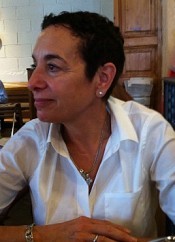David Golumbia
Is there, was there, will there be, a digital turn? In (cultural, textual, media, critical, all) scholarship, in life, in society, in politics, everywhere? What would its principles be?
The short prompt I offered to the contributors to this special issue did not presume to know the answers to these questions.
That means, I hope, that these essays join a growing body of scholarship and critical writing (much, though not by any means all, of it discussed in the essays that make up this collection) that suspends judgment about certain epochal assumptions built deep into the foundations of too much practice, thought, and even scholarship about just these questions.
- In “The New Pythagoreans,” Chris Gilliard and Hugh Culik look closely at the long history of Pythagorean mystic belief in the power of mathematics and its near-exact parallels in contemporary promotion of digital technology, and especially surrounding so-called big data.
- In “From Megatechnic Bribe to Megatechnic Blackmail: Mumford’s ‘Megamachine’ after the Digital Turn,” Zachary Loeb asks about the nature of the literal and metaphorical machines around us via a discussion of the 20th century writer and social critic (and) Lewis Mumford’s work, one of the thinkers who most fully anticipated the digital revolution and understood its likely consequences.
- In “Digital Proudhonism,” Gavin Mueller writes that “a return to Marx’s critique of Proudhon will aid us in piercing through the Digital Proudhonist mystifications of the Internet’s effects on politics and industry and reformulate both a theory of cultural production under digital capitalism as well as radical politics of work and technology for the 21st century.”
- In “Mapping Without Tools: What the Digital Turn Can Learn from the Cartographic Turn.” Tim Duffy pushes back “against the valorization of ‘tools’ and ‘making’ in the digital turn, particularly its manifestation in digital humanities (DH), by reflecting on illustrative examples of the cartographic turn, which, from its roots in the sixteenth century through to J.B. Harley’s explosive provocation in 1989 (and beyond) has labored to understand the relationship between the practice of making maps and the experiences of looking at and using them. By considering the stubborn and defining spiritual roots of cartographic research and the way fantasies of empiricism helped to hide the more nefarious and oppressive applications of their work, I hope to provide a mirror for the state of the digital humanities, a field always under attack, always defining and defending itself, and always fluid in its goals and motions.”
- Joseph Erb, Joanna Hearne, and Mark Palmer with Durbin Feeling, in “Origin Stories in the Genealogy of Cherokee Language Technology,” argue that “the surge of critical work in digital technology and new media studies has rarely acknowledged the centrality of Indigeneity to our understanding of systems such as mobile technologies, major programs such as Geographic Information Systems (GIS), digital aesthetic forms such as animation, or structural and infrastructural elements of hardware, circuitry, and code.”
- In “Artificial Saviors,” tante connects the pseudo-religious and pseudo-scientific rhetoric found at a surprising rate among digital technology developers and enthusiasts: “When AI morphed from idea or experiment to belief system, hackers, programmers, ‘data scientists,’ and software architects became the high priests of a religious movement that the public never identified and parsed as such.”
- In “The Endless Night of Wikipedia’s Notable Woman Problem,” Michelle Moravec “takes on one of the ‘tests’ used to determine whether content is worthy of inclusion in Wikipedia, notability, to explore how the purportedly neutral concept works against efforts to create entries about female historical figures.”
- In “The Computational Unconscious,” Jonathan Beller interrogates the “penetration of the digital, rendering early on the brutal and precise calculus of the dimensions of cargo-holds in slave ships and the sparse economic accounts of ship ledgers of the Middle Passage, double entry bookkeeping, the rationalization of production and wages in the assembly line, and more recently, cameras and modern computing.”
- In “What Indigenous Literature Can Bring to Electronic Archives,” Siobhan Senier asks, “How can the insights of the more ethnographically oriented Indigenous digital archives inform digital literary collections, and vice versa? How do questions of repatriation, reciprocity, and culturally sensitive contextualization change, if at all, when we consider Indigenous writing?”
- Rob Hunter provides the following abstract of “The Digital Turn and the Ethical Turn: Depoliticization in Digital Practice and Political Theory”:
The digital turn is associated with considerable enthusiasm for the democratic or even emancipatory potential of networked computing. Free, libre, and open source (FLOSS) developers and maintainers frequently endorse the claim that the digital turn promotes democracy in the form of improved deliberation and equalized access to information, networks, and institutions. Interpreted in this way, democracy is an ethical practice rather than a form of struggle or contestation. I argue that this depoliticized conception of democracy draws on commitments—regarding personal autonomy, the ethics of intersubjectivity, and suspicion of mass politics—that are also present in recent strands of liberal political thought. Both the rhetorical strategies characteristic of FLOSS as well as the arguments for deliberative democracy advanced within contemporary political theory share similar contradictions and are vulnerable to similar critiques—above all in their pathologization of disagreement and conflict. I identify and examine the contradictions within FLOSS, particularly those between commitments to existing property relations and the championing of individual freedom. I conclude that, despite the real achievements of the FLOSS movement, its depoliticized conception of democracy is self-inhibiting and tends toward quietistic refusals to consider the merits of collective action or the necessity of social critique.
- John Pat Leary, in “Innovation and the Neoliberal Idioms of Development,” “explores the individualistic, market-based ideology of ‘innovation’ as it circulates from the English-speaking first world to the so-called third world, where it supplements, when it does not replace, what was once more exclusively called ‘development.’” He works “to define the ideology of ‘innovation’ that undergirds these projects, and to dissect the Anglo-American ego-ideal that it circulates. As an ideology, innovation is driven by a powerful belief, not only in technology and its benevolence, but in a vision of the innovator: the autonomous visionary whose creativity allows him to anticipate and shape capitalist markets.”
- Annemarie Perez, in “UndocuDreamers: Public Writing and the Digital Turn,” writes of a “paradox” she finds in her work with students who belong to communities targeted by recent immigration enforcement crackdowns and the default assumptions about “open” and “public” found in so much digital rhetoric: “My students should write in public. Part of what they are learning in Chicanx studies is about the importance of their voices, of their experiences and their stories are ones that should be told. Yet, given the risks in discussing migration and immigration through the use of public writing, I wonder how I as an instructor should either encourage or discourage students from writing their lives, their experiences as undocumented migrants, experiences which have touched, every aspect of their lives.”
- Gretchen Soderlund, in “Futures of Journalisms Past (or, Pasts of Journalism’s Future),” looks at discourses of “the future” in journalism from the 19th and 20th centuries, in order to help frame current discourses about journalism’s “digital future,” in part because when “when it comes to technological and economic speedup, journalism may be the canary in the mine.”
- In “The Singularity in the I790s: Toward a Prehistory of the Present With William Godwin and Thomas Malthus,” Anthony Galluzzo examines the often-misunderstood and misrepresented writings of William Godwin, and also those of Thomas Malthus, to demonstrate how far back in English-speaking political history go the roots of today’s technological Prometheanism, and how destructive it can be, especially for the political left.
“Digital Turn” Table of Contents


